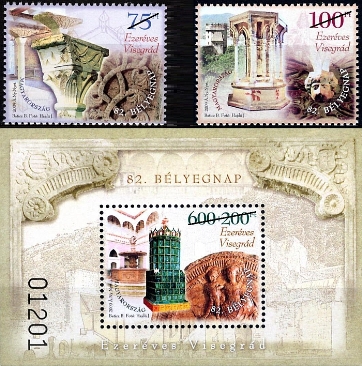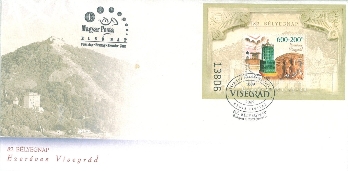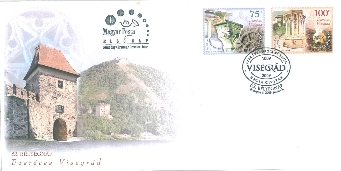82ND STAMP DAY - MILLENNIUM OF THE FOUNDATION OF VISEGRÁD
Date of issue: 5 June 2009

Lying to the north of Budapest on the Danube Bend, Visegrád is one of
Hungary’s oldest towns. Saint Stephen created the governorship of his
first comitatus, a county protected by a castle, here on Sibrik Hill.
The castle is first mentioned in written records in 1009. After the
Mongol invasion of 1241, the extension of the defences began: the
hilltop citadel, the defensive walls closing the valley, the hexagonal
keep and the lower castle were built. The heyday of the town that grew
up around it was under the Angevin kings, Sigismund of Luxembourg and
then King Matthias. Between 1323 and 1408 it was the royal seat of the
kings of Hungary. During the reign of King Matthias the court of Buda
and Visegrád was one of the centres of the European Renaissance. The
town lost its political significance when Hungary was partitioned into
three parts during the Turkish occupation. It was granted the status of a
town in 2000. Source:
http://hu.wikipedia.org
The 1000-year history of Visegrád has been portrayed according to
periods of art history in the philatelic novelties for the 82nd Stamp
Day. The stamp design of the block with a surcharge features the
Renaissance courtyard and fountain from the age of King Matthias, a
Renaissance ceramic stove and a red marble relief with the Visegrád
Madonna that once adorned the royal chapel. In the surrounding frame
there is an image of the royal palace.
The HUF 75 stamp of the set shows a Romanesque monument, featuring some capitals and columns, and details of these from the decanal church and monastery of St Andrew. In the background printing there is a drawing of a reconstruction of the 11th-century castle governor’s building. The HUF 100 stamp recalls the Gothic age, showing the fountain in the court from the time of King Sigismund, as well as the lower castle tower and keep. In the background printing there is a drawing of a reconstruction of the southern aspect of the citadel from the age of Sigismund.
The first day cover shows a picture of Visegrád today. The special postmark includes the town’s millennium emblem.
Magyar Posta devotes the proceeds from the surcharge of the block to supporting organised stamp collecting. The sum of the surcharge (HUF 200) may not be used to pay for postage.
SO
Order code: 2009140030011 (block) - 2009140060012 (FDC)
2009130050211 (set) - 2009130060012 (FDC)
Date of issue: 5 June 2009
Printed by Állami Nyomda
Designed by Barnabás Baticz
Imperforated size of block: 90 x 60 mm, size of perforated stamp in it: 40 x 31.5 mm.
The perforated size of the set of stamps is 40 x 30 mm. There are 50 stamps per sheet.
80,000 copies of the block and 500,000 copies of the set have been issued.


More information: philately@posta.hu

